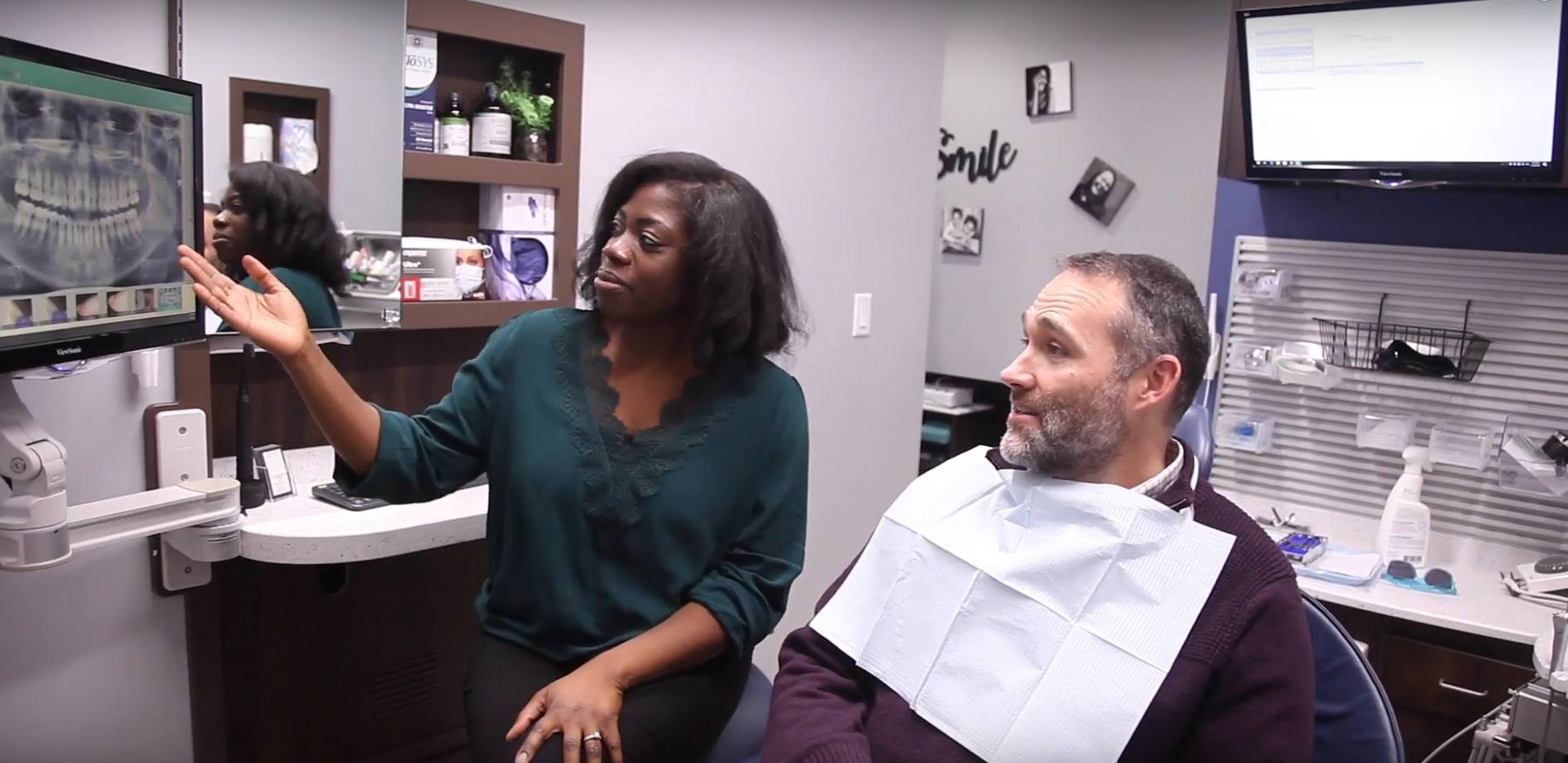





Complete Dentistry
Focused on Your Families
Your wellbeing is important to you, and you deserve a dentist in Delafield who understands how to help you smile in a way that doesn’t compromise your overall health. No one understands this better than us, and we can’t wait to show you how we’re exceptionally qualified to exceed expectations.
Dental, Whole-Body Approach
Your body, your decision - your caring advocate.
Highly-Skilled, Always Learning
Committed to offering exceptional dentistry.
We Never Judge or Lecture
We’re only concerned with helping you smile.
Honesty Above all Else
Your best interests are always considered.
Dentists Who Truly Care
Our Delafield dentists share a deep passion for helping patients enjoy better overall health by improving their oral health. Here, you won’t simply get band-aid solutions but compassionate care that contributes to your entire body’s wellness. As a member of our team Dr. Udoka Holinbeck recently became a Fellow of the Academy of General Dentistry, an impressive accomplishment, after years of dedicated effort and advanced training. Our experienced team offer the highest quality of care. Whether it’s time for your dental checkup and cleaning, you are interested in transforming your smile with Invisalign, or anything in between, our dentist near you looks forward to meeting you in our office soon!
Learn What Makes Our Practice Better
Featured Dental Services
How We Help You SmileDr. Holinbeck will work closely with patients to develop custom, holistic treatment plans that will leave you feeling inspired to smile. Whether you need to replace amalgam fillings with a more biocompatible alternative or are ready to seamlessly rebuild missing teeth, the services you need are waiting here in Delafield.
Safe Amalgam
Filling Removal
CEREC® 1-Day
Biomimetic Restorations
Tooth
Extractions
Metal-Free Zirconia
Dental Implants
Invisalign®
Clear Braces
Ozone/Oxygen
Therapy
Invisalign, Delafield, WI
Want Straight Teeth? Get Invisalign!For adults and teens who have crooked, crowded, or gapped teeth, they don’t have to get bulky metal braces anymore. With Invisalign, a patient can achieve the perfectly straight smile they desire quickly, comfortably, and discreetly thanks to a set of custom-made clear aligners.
And, you can trust that you’ll be in great hands with Dr. Holinbeck. She is a highly-experienced Invisalign provider and a fellow of the Academy of General Dentistry, putting her in the top 6% of North American dentists. She also utilizes a fully digital workflow, meaning she can take impressions and design someone’s aligners without having to use messy dental putty or inaccurate molds. Thanks to all of this, Dr. Holinbeck is able to help her patients reach their final results in just 6-12 months rather than the usual 18+ months.
What Other
Dental
Patients
Are Saying
Read More Reviews




Our Dental Mission
We Don't Treat Patients... We Serve PeopleWe are Wisconsin’s #1 biological dental group. We are proud to provide holistic dentistry for those who value total body health and a more natural approach using modern, state-of-the-art technology. We prioritize an individual approach, exceptional service, and patient education, and we welcome those who seek our services from all over the country.
We are inspired to do this work because we believe that optimal oral health is the foundation for total body health. We feel it is our calling to provide care that makes a measurable difference in the health and quality of life of so many people.
How We Make Dentistry Affordable
Our dental team near Oconomowoc never wants cost to be what stands between you and the phenomenal dental experience you deserve. To ensure that doesn’t happen, our team is proud to offer a Wellness Program, which provides many of the same benefits as dental insurance but without the deductibles, waiting periods, and red tape. We also welcome low-to-no interest financing through CareCredit, which allows you to fit the cost of even the most extensive treatment plans into your monthly budget! From preventive care and CEREC® dental crowns to implant dentures, we will go the extra mile to make understanding the cost and handling the financial component of your care stress-free.
Follow Us
on Instagram!
Frequently Asked Questions
No matter the type of oral healthcare you need, the team at Bionica Dental Wellness of Delafield is here to answer your questions, address your concerns, and provide high-quality, holistic dental services designed to meet your need. From general checkups and cleanings to metal-free restorations to Invisalign clear braces, we understand you want to know more about us, our services, and how we can make your experience safe and comfortable. We’re ready to help you take the next step in your search for a trusted natural dentist, which is why we’ve compiled the answers to many of the most common questions asked by current and prospective patients. If you are unable to find your question listed, we invite you to contact our office to request an appointment.
How do I find the best place to get dental work done?
Your smile deserves the best possible treatment. That means finding a trusted “dentist near me” who can provide the level of care you need and deserve. As you navigate your search, it is often difficult trying to determine who is the right choice. One way to make this process much easier is to narrow your list of criteria to those that are most important. Do you want a dentist who takes a holistic, whole-body approach? Are you looking for a professional located near your workplace or home? Do you prefer a dentist offers affordable plans for those without dental insurance? At Bionica Dental Wellness of Delafield, you’ll be pleased to learn that our team offers all of this and much more, allowing for you to experience an all-encompassing, first-rate dental practice. If you need additional affirmation, we invite you to read our patient reviews and watch our video testimonials!
What do you do if you can’t afford a dentist?
An important thing to remember when needing regular dental care is to never forgo trips to the dentist because you believe you cannot afford it. Neglecting preventive or restorative treatment can lead to timely and costly procedures later on. At our dental office, we understand the cost of dental services can be expensive; however, we offer a Wellness Program that is a membership plan. Not only are there no deductibles, maximums, claims forms, pre-authorization requirements, or waiting periods, but you’ll receive the same great benefits without the red tape of traditional insurance. You have the option to pay by the month or a one-time annual fee. You’ll receive basic dental care as well as discounts starting at 10% on available services.
You also have the option to apply for flexible financing through CareCredit should you undergo a more complex treatment and need assistance to cover the remaining costs.
How can I find a female dentist?
It is believed that 1/3 of all dentists practicing in the United States are female, and more than 50% of all dental students (currently) are female. Should you prefer a woman to care for your oral health, the best place to start is by Googling “female dentist near me.” This will provide accurate and helpful results that can help you to narrow your search. As you navigate the individuals that stand out among their peers, you will find that reviewing a dentist’s biography on their website as well as reading additional information about their practice can help you determine if a particular professional is right for you. Dr. Udoka Holinbeck and Dr. Hira Chughtai are both female dentists at Bionica Dental Wellness of Delafield. Their commitment to the field and ability to help patients achieve total body wellness are just a few of the many reasons patients choose these two female dentists to improve their oral and overall health.
How do I get emergency dental care?
Although you cannot predict when a dental emergency will occur, it can be reassuring to know that you have a dental professional ready and willing to help. While it might seem as if going to the local emergency room is the right decision, there are only a few instances in which that is necessary: a broken or fractured jaw, difficulty breathing due to increased swelling, and continuous bleeding from the mouth. Otherwise, it is best that you seek the help of a trusted emergency dentist. At Bionica Dental Wellness of Delafield, our dental team near Waukesha is here to care for your urgent need by providing same-day appointments to those experiencing dental emergencies. It is our goal to address your symptoms and reduce immediate pain before formulating a treatment plan to address the underlying cause.


